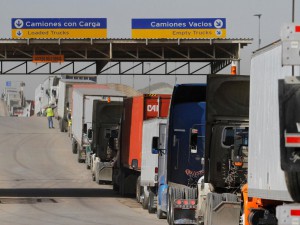
Trucks are already waiting in long lines to cross the U.S.-Mexico border, sometimes as long as 17 hours.
Automakers and suppliers are beginning to feel the sting of long delays at the U.S.-Mexico border crossing that have cut the number of inbound trucks to the U.S. by half due to delays as a long as 17 hours.
The reason for the delay is a decision by the Trump administration to move 750 border agents from commercial to immigration duties in order to deal with the influx of families seeking asylum in the United States.
The result has been massive backlogs at crossing points, which can be problematic for a just-in-time industry like automotive, which does $1.7 billion in daily trade across the border. Many times parts travel back and forth across the border before finding their way into a finished automobile.
“The situation in Ciudad Juarez is very serious because these auto parts go to plants in the United States and obviously they put at risk the operation in the United States,” Eduardo Solis, the president of the Mexican Auto Industry Association (AMIA), said on Monday.
(Trump won’t close border but threatens to scuttle NAFTA replacement. Click Here for the story.)
Last year, 2.6 million autos were exported from Mexico to the U.S., which is the highest total ever for the industry. The models that will likely be impacted the most will be big sellers like the Chevy Silverado and Ram pickup trucks. It’s not just the automakers that are being hurt — suppliers are taking a hit too.

President Donald Trump rescinded his threat to close the border between Mexico and the U.S. but moved 750 agents from commercial to immigrant teams.
“The North American supply chain and continued viability of the entire industry requires an open, functioning border,” the Motor & Equipment Manufacturers Associationsaid. “U.S. Customs and Border Protection has already reassigned officers away from trade processing, resulting in extensive border slowdowns, disruptions to companies’ supply chains and overall confusion at the border.”
The United States imports more than $55 billion in auto parts and ships $30 billion to Mexico. Several observers noted that Trump has made American manufacturing jobs a focus of his presidency and this move would put those jobs in jeopardy.
Even a temporary halt to this critical flow of trade between countries will have an impact on both the domestic auto care industry, which employs 4.6 million people nationwide, and on the safe operation of the 280.6 million cars and trucks on the road today.
(Click Here for more about suppliers, dealers expressing concern about stability of the industry.)
It’s not just the auto industry being harmed right now. A coalition of 18 freight, agricultural and manufacturing associations sent a letter to White House economic advisor Larry Kudlow and acting White House chief of staff Mick Mulvaney to “express serious concerns with any new burdens that would slowdown or delay the movement of commercial goods across the U.S.-Mexico border.”
According to Manuel Sotelo, vice president at the Mexican National Chamber of Freight Transport’s north division, trucks were lining up 17 hours before the crossing plaza in El Paso, Texas, opened on Monday morning, hoping to avoid a repeat of about 7,500 trucks that didn’t make it across before this.
“This is not normal. We had never seen this before in Ciudad Juarez,” Sotelo told Reuters.
Despite elevated costs, some Mexican exporters are turning to air freight to avoid the mile-long lines at the border. Those costs get passed along to consumers in the U.S.
(Auto industry frets as Trump threatens to close border. Click Here for the story.)
“We’re using charter (planes) which cost between $35,000 and $100,000 depending on the volume and merchandise,” said Pedro Chavira, who heads the manufacturing industry chamber INDEX in Ciudad Juarez.
